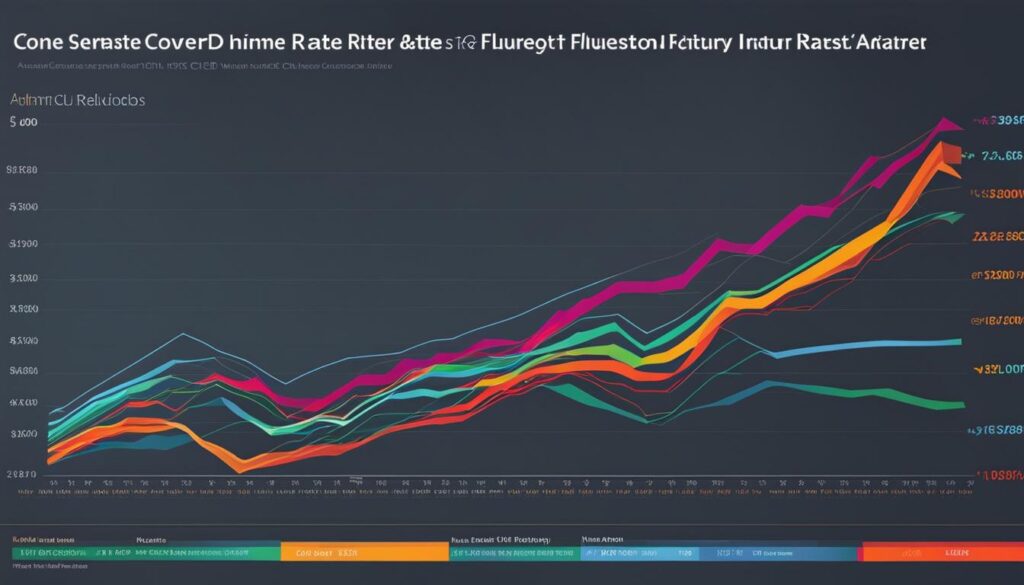A certificate of deposit (CD) is a savings product that offers secure investing with fixed deposits. CDs provide a higher interest rate than traditional savings accounts and are considered a safer and more conservative investment option. They offer a fixed, guaranteed rate of return, making them a popular choice for investors looking for stability and predictability.
- Certificates of Deposit (CDs) offer higher interest rates compared to savings accounts.
- CDs provide a fixed and guaranteed rate of return, making them a secure investment option.
- CDs are considered low-risk and are FDIC insured, protecting your deposit up to $250,000 per account holder, per issuer.
- Opening a CD is similar to opening a standard bank deposit account, where you agree to a fixed interest rate, term length, and principal amount.
- CD rates are influenced by factors such as the Federal Reserve’s rate-setting actions, credit rating of the issuing institution, and current market conditions.
Understanding Certificates of Deposit (CDs)
When it comes to investing, understanding the ins and outs of different financial products is essential. Certificates of Deposit (CDs) are a popular choice for individuals looking for secure investments with fixed deposits. Let’s take a closer look at what CDs are and how they work.
Opening a CD is similar to opening a standard bank deposit account. You start by selecting a CD option that suits your financial goals. This includes choosing an interest rate, a specific term length, a principal amount, and the institution where you will open the CD. The interest rate remains locked for the duration of the term, providing a clear and predictable return on your investment.
The term length is an important factor to consider when opening a CD. It determines how long your funds must remain deposited to avoid penalty fees. Common terms range from a few months to several years, allowing you to tailor your investment to match your financial objectives. The principal amount is the initial deposit you make when opening the CD. It’s important to note that the institution sets the terms and may have specific rules for early withdrawal and automatic reinvestment.
Understanding the options, interest rates, terms, and principal amount is crucial when considering investing in Certificates of Deposit.
Advantages of Certificates of Deposit (CDs)
Certificates of Deposit (CDs) offer numerous advantages to investors looking for secure and reliable investment options. Understanding the benefits of CDs can help individuals make informed decisions and maximize their financial growth. Here are some key advantages of investing in CDs:
Higher Interest Rates
CDs typically offer higher interest rates compared to traditional savings accounts. This means that your investment has the potential to grow at a faster rate, allowing you to earn more money over time. The fixed and guaranteed interest rate of CDs provides stability and predictability, ensuring that your investment is working hard for you.
Guaranteed Returns
One of the most attractive features of CDs is their guaranteed returns. Unlike other investment options that may be subject to market fluctuations, CDs provide a fixed rate of return for a specific period of time. This guarantee offers peace of mind, knowing that your investment will yield a predictable outcome.
Risk-Free Investment
CDs are considered low-risk investments, making them an attractive option for conservative investors. Unlike stocks or other high-risk investments, CDs are not subject to market volatility. This means that even in times of economic uncertainty, your investment remains secure. Additionally, CDs are FDIC insured, protecting your deposit up to $250,000 per account holder, per issuer.
By choosing certificates of deposit as part of your investment strategy, you can benefit from higher interest rates, guaranteed returns, and the peace of mind that comes with a risk-free investment. CDs are an excellent option for individuals who prioritize stability, security, and reliable growth. Explore the different CD options available to find the one that best suits your financial goals and needs.

Factors Affecting CD Rates
The interest rates on certificates of deposit (CDs) are influenced by several factors. Understanding these factors can help investors make informed decisions about their CD investments. Here are some key factors that affect CD rates:
Credit rating
The credit rating of the institution offering the CD plays a crucial role in determining the interest rate. Higher-rated institutions with a strong credit history are generally able to offer more competitive rates to attract investors. On the other hand, institutions with lower credit ratings may offer lower rates to compensate for the perceived risk.
Interest rate fluctuations
The interest rates on CDs are also subject to fluctuations in the broader interest rate market. Changes in the Federal Reserve’s rate-setting actions and the prime rate can impact CD rates. When the prime rate increases, CD rates often follow suit. It’s important to keep an eye on interest rate trends to make informed decisions about the timing of your CD investments.
Term length
The length of the CD term can also affect the interest rate. Generally, longer-term CDs offer higher interest rates than shorter-term CDs. This is because investors are willing to commit their funds for a longer period, and the institution can offer a higher rate as a result. However, it’s important to consider your own financial goals and liquidity needs when choosing the term length for your CD investment.
Current market conditions
CD rates can also be influenced by current market conditions. Economic factors such as inflation, economic growth, and market demand for CDs can impact the rates offered by institutions. When the economy is strong and demand for CDs is high, institutions may offer higher rates to attract investors. Conversely, during periods of economic uncertainty or low demand, rates may be lower.
By keeping these factors in mind, investors can make more informed decisions about their CD investments. It’s important to consider your own financial goals, risk tolerance, and liquidity needs when choosing the right CD for your portfolio.

Pros and Cons of Certificates of Deposit (CDs)
Certificates of Deposit (CDs) offer several advantages for investors, making them a popular choice for those seeking fixed returns and low-risk investments. However, like any investment option, CDs also have their drawbacks that investors should consider. Let’s explore the pros and cons of CDs in more detail.
Pros of Certificates of Deposit (CDs)
- Fixed Returns: CDs offer a fixed rate of return, providing investors with predictable earnings over the term of the deposit. This makes them an attractive option for individuals who prefer stability and certainty in their investments.
- Low Risk: Unlike investments in stocks or bonds, CDs are considered a low-risk investment. They are insured by the Federal Deposit Insurance Corporation (FDIC) up to $250,000 per account holder, per issuer, providing an added layer of security.
| Pros | Cons |
|---|---|
| Fixed Returns | Lack of Liquidity |
| Low Risk | Potential Inflation Risk |
| FDIC Insured |
Cons of Certificates of Deposit (CDs)
- Lack of Liquidity: Unlike other investment options, CDs generally have limited liquidity. Withdrawing funds before the maturity date may result in penalty fees or loss of interest earned.
- Potential Inflation Risk: Although CDs provide stability, their fixed interest rates may not keep up with inflation rates. Over time, this could reduce the purchasing power of the investment.
“Certificates of Deposit offer fixed returns and low risk, making them a secure investment option for individuals. However, lack of liquidity and potential inflation risk are important factors that investors should consider.”
While CDs offer several benefits, including fixed returns, low risk, and FDIC insurance, it’s important for investors to weigh the pros and cons before making a decision. CDs can be a suitable option for those seeking stability and guaranteed returns, but individuals with a higher risk tolerance and a desire for greater liquidity may need to explore alternative investment avenues.

Conclusion
In conclusion, certificates of deposit (CDs) offer a secure and conservative investment option for individuals seeking fixed returns and low-risk investments. With higher interest rates compared to savings accounts and guaranteed returns, CDs provide stability and predictability in an uncertain financial landscape.
Despite their advantages, it is essential to consider the limitations of CDs. These include limited liquidity, meaning you may face penalties for early withdrawal. Additionally, CDs may not keep pace with inflation rates, which can potentially erode your purchasing power over time. It is vital to weigh these factors against the benefits before making investment decisions.
Overall, including CDs as part of your financial portfolio can enhance your investment strategy and provide a reliable source of income. Whether you are a cautious investor looking for secure investments or someone seeking fixed returns, CDs are an excellent way to diversify your portfolio and protect your savings.
FAQ
What is a certificate of deposit (CD)?
A certificate of deposit (CD) is a savings product that earns interest on a lump sum for a fixed period of time.
How does opening a CD work?
Opening a CD is similar to opening a standard bank deposit account. You agree to a fixed interest rate, a specific term length, a principal amount, and the institution.
What are the advantages of CDs?
CDs offer higher interest rates compared to savings and money market accounts, guaranteed returns, and FDIC insurance. They are considered a low-risk investment option.
What factors affect CD rates?
CD rates are influenced by the Federal Reserve’s rate-setting actions, the credit rating of the issuing institution, the length of the term, and current market conditions.
What are the pros and cons of CDs?
CDs provide fixed returns, low risk, and FDIC insurance. However, they have limited liquidity and may offer lower returns compared to higher risk investments. CDs may also not keep up with inflation rates.
Are Treasury Securities as Safe as Certificates of Deposit for Investing?
When it comes to investing, many wonder if government bonds as safe haven, like Treasury securities, are as secure as certificates of deposit. While both options carry a low level of risk, Treasury securities are often considered even safer due to the backing of the U.S. government. As a result, they are seen as a reliable investment choice for those seeking stability and preservation of capital.


Pingback: Annuities: Securing Steady Income in Retirement through Insurance Products – Straight Fire Money